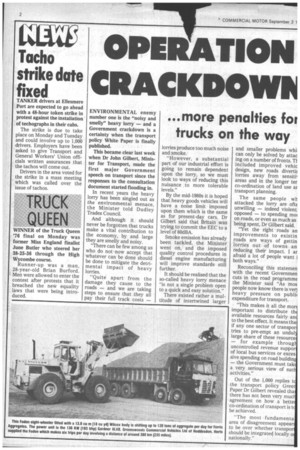OPERATION CRACKDOWN
Page 4

If you've noticed an error in this article please click here to report it so we can fix it.
...more penalties for trucks on the way
ENVIRONMENTAL enemy number one is the "noisy and smelly" heavy lorry — and a Government crackdown is a certainty when the transport policy White Paper is finally published.
This became clear last week when Dr John Gilbert, Minister for Transport, made the first major Government speech on transport since the responses to the consultation document started flooding in.
In recent years the heavy lorry has been singled out as the environmental menace, the Minister told Dudley Trades Council.
And although it should never be forgotten that trucks make a vital contribution to the economy, by and large they are smelly and noisy.
"There can be few among us who do not ,now accept that whatever can be done should be done to mitigate the detrimental impact of heavy lorries.
"Quite apart from the damage they cause to the roads — and we are taking steps to ensure that they all pay their full track costs — lorries produce too much noise and smoke.
"However, a substantial part of our industrial effort is going to remain dependent upon the lorry, so we must look to ways of reducing this nuisance , to more tolerable levels."
By the mid-1980s it is hoped that heavy goods vehicles will have a noise limit imposed upon them which is the same as for present-day cars. Dr Gilbert said that Britain was trying to commit the EEC to a level of 80dBA.
Smoke emission has already been tackled, the Minister went on, and the imposed quality control procedures in diesel engine manufacturing will improve standards still further.
It should be realised that the so-called heavy lorry menace "is not a single problem open to a quick and easy solution."
There existed rather a multitude of intertwined larger and smaller problems whii can only be solved by attac ing on a number of fronts. TI included improved vehic design, new roads divertit lorries away from sensitil areas and in the longer ter co-ordination of land use ar transport planning.
The same people wh attacked the lorry are oftE unwilling — indeed violent' opposed — to spending moi on roads, or even as much as being spent, Dr Gilbert said.
"Yet the right roads an improvements to existin roads are ways of gettin lorries out of towns an reducing their impact. I ar afraid a lot of people want i both ways."
Reconciling this statemen with the recent Governmen cuts in the road programme the Minister said "As mos people now know there is ver3 heavy pressure on public expenditure for transport.
"This makes it all the mor important to distribute th available resources fairly an to the best effect. It means tha if any one sector of transpo tries to pre-empt an undul large share of these resource — for example throug uncontrolled revenue suppo of local bus services or exces sive spending on road buildin — the Government must tak a very serious view of suc activities."
Out of the 1,000 replies t the transport policy Gree Paper Dr Gilbert revealed tha there has not been very muc agreement on how a bette co-ordination of transport is t be achieved.
"The most fundamenta area of disagreement appear to be over whether transpor should be integrated locally o nationally."




















































































